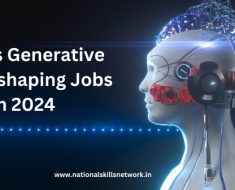Syllabus: Science and technology
Source: LM
Context: Artificial general intelligence (AGI) holds the potential to revolutionize India’s trajectory.
What is Artificial general intelligence (AGI)?
Artificial General Intelligence (AGI) surpasses conventional AI in sophistication. Unlike AI, AGI aims for a broad, human-like intelligence, encompassing reasoning, learning, and creativity. It generalizes knowledge, engages in complex reasoning, and exhibits self-awareness and creativity. AGI seeks to emulate human cognitive abilities across diverse tasks and domains.


Applications of AGI:
| Application | Example |
| Healthcare | AGI can analyze diverse medical data to offer personalized treatment options, improving outcomes in personalized medicine. |
| Finance and Business | AGI can automate tasks in finance, providing real-time analysis and accurate market predictions for better decision-making. |
| Education Sector | AGI can revolutionize adaptive learning platforms, offering personalized education tailored to individual student needs globally. |
| Space Exploration | AGI can operate autonomous systems for space exploration, analyze data from space missions, and contribute to new discoveries. |
| Military and Defense | AGI can enhance surveillance, military strategies, and combat systems for defence purposes. |
Initiatives taken:
| Initiative | Description |
| Global Partnership on Artificial Intelligence (GPAI) | India’s participation in an international initiative aimed at fostering collaboration among nations to promote the responsible development and use of artificial intelligence. |
| US India Artificial Intelligence Initiative | Collaborative efforts between India and the United States to advance research, development, and application of artificial intelligence technologies for mutual benefit. |
| Responsible Artificial Intelligence (AI) for Youth | An initiative aimed at educating and empowering youth to understand and responsibly utilize artificial intelligence technologies for societal benefit. |
| AIRAWAT (Artificial Intelligence Research, Analytics and Knowledge Assimilation Platform) | A platform facilitating research, analytics, and knowledge assimilation in the field of artificial intelligence, fostering innovation and collaboration among researchers, academia, and industry professionals. |
| IndiaAI Mission | Approved by the Indian Cabinet in March 2024, this initiative involves significant funding over five years to develop AI infrastructure accessible to startups, academia, and industry, positioning India as a global AI leader. |
| Artificial Intelligence (AI) Act
|
The European Union has finalized the world’s first comprehensive law regulating artificial intelligence, known as the AI Act. |
Concerns Related to AGI:
- Existential Risk: Concerns about AGI surpassing human intelligence and becoming excessively autonomous, posing existential risks that are challenging to anticipate and control.
- Job Losses and Unemployment: Potentially substantial decrease in job opportunities due to AGI automation, leading to social and economic inequality and concentration of power among overseers.
- Human Oversight and Accountability: Risks associated with AGI controlling information environments and influencing critical areas like elections, raising concerns about oversight and accountability.
- Environmental Concern: Significant energy consumption and e-waste generation associated with developing AGI systems, highlighting environmental impact concerns.
- Ethical Dilemmas: AGI advancement raises ethical challenges related to responsibility, confidentiality, and biased decision-making, requiring compliance with ethical norms to avoid unintended outcomes and inequalities.
- Loss of Basic Human Skills and Creativity: Reduced human involvement in tasks may lead to a decline in creativity and innovation, with AGI potentially producing more innovative but less diverse outcomes compared to human works.
What should India do?
- Establish Dedicated AI Department: Create a central authority to coordinate AI efforts, setting standards and policies aligned with national interests.
- Democratize Data Access: Liberate and democratize access to vast datasets across sectors to stimulate AI development tailored to India’s unique landscape.
- Build Strategic AI Ecosystem: Develop AI capabilities in defence, drone technology, and cybersecurity, supporting the creation of companies in these fields.
- Launch AI Skilling Initiative: Train 50 million people in AI usage skills and 1 million in advanced AI development skills, focusing on data literacy, ethics, and sector-specific applications.
- Foster Educational Partnerships: Collaborate with universities and technical institutes to integrate AI-focused curricula and provide scalable access to industry training through online platforms.
Conclusion:
Moving forward, establishing robust ethical frameworks is paramount for the responsible development and deployment of AGI. Collaborative efforts involving governments, industry stakeholders, and researchers are necessary to create guidelines emphasizing safety, transparency, and accountability. Prioritizing transparency and explainability in AGI systems is crucial to ensure understandable and verifiable decision-making processes, fostering trust and minimizing the risk of unintended consequences.
Mains Link:
What are the main socio-economic implications arising out of the development of IT industries in major cities of India? (UPSC 2022)
“The emergence of the Fourth Industrial Revolution (Digital Revolution) has initiated e-Governance as an integral part of government”. Discuss. (USPC 2020)
Prelims Link:
- Bring down electricity consumption in industrial units
- Create meaningful short stories and songs
- Disease diagnosis
- Text-to-Speech Conversion
- Wireless transmission of electrical energy
Select the correct answer using the code given below:
(a) 1, 2, 3 and 5 only
(b) 1, 3 and 4 only
(c) 2, 4 and 5 only
(d) 1, 2, 3, 4 and 5
Ans: (b)




